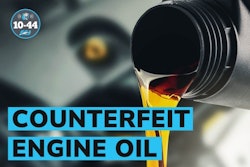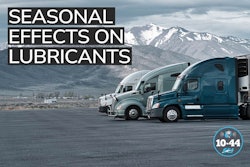Despite 10- and even 5-weight diesel engine oils being the norm for nearly 15 years, a lot of motor carriers are still using a 15 weight. Unless your trucks are 14 years old or older, it probably was factory filled with something lighter than a 15w – probably a 10w. Kevin Carabell, regional technical services specialist for Chevron Lubricants, joins the 10-44 this week has some news for users of heavy oils.
Contents of this video
00:00 10-44 intro
00:30 Heavy duty diesel engine oil
01:12 pre-2010 equipment
02:07 Newer equipment
02:28 Lower viscosity engine oils
04:25 Engine oils viscosity index
08:28 Longer oil life and cold starts
08:57 Lighter weight oils and leaks
Speaker 1 (00:00):
This week's 10-44 is brought to you by Chevron Delo 600 ADF ultra-low ash diesel engine oil. It's time to kick some ash. Do you use heavyweight engine oil because you're addicted to oil pressure? Well, we've got some news for you. You're watching CCJs 10-44, a weekly webisode that brings you the latest trucking industry news and updates from the editors of CCJ. Don't forget to subscribe and hit the bell for notifications so you'll never miss an installment of 10-44.
Jason Cannon (00:29):
Hey everybody, welcome back. I'm Jason Cannon and my co-host on the other side is Matt Cole. Heavy-duty diesel engine oil undergoes a pretty significant transformation about every 10 years and we're not too far from the next horizon, which is likely to include a zero-weight. But despite 10W and even 5W being the norm for nearly 15 years, a lot of motor carriers are out there still using 15 weight oil.
Matt Cole (00:52):
Unless your trucks are 14 years old or older, it was probably factory filled with something lighter than 15W, probably a 10W.
Jason Cannon (00:59):
Kevin Carabell, regional technical service specialist for Chevron Lubricants, joins the 10-44 this week. And if you're running 15 weight oil in a 2010 model year or newer tractor, he's got some news for you.
Kevin Carabell (01:12):
So, equipment that's pre-2010, so coming up on 15, 14, 15 years old now, I would say that equipment is probably the right point where you might want to think about anything older than that, you'd probably want to keep it on 1540. It's old enough that that's what it was designed for, that's what it was engineered. What you see is pressure, but what you're really wanting is oil film thickness, right? That's the benefit that you get, that you get a little thicker film with a little heavier weight oil, the pump's doing the same amount of work, and you're getting that protection for bearings and pieces inside the equipment that are going to otherwise have risk of coming into contact with each other.
(02:01):
The oil film keeps everything separated. It's floating the parts, right? So around 2010, I think, is about that point. But newer than 2010, you might be surprised. Check your owner's manual. A lot of equipment today, the recommendation from the OEM is to use SAE 10W30. It's built for SAE 10W30. It's engineered into it. They've designed around SAE 10W30. So you're kind of leaving money on the table if you don't take advantage of that.
Matt Cole (02:28):
Thick oil is generally an oil pressure play, and lighter oils or lower viscosity oils are generally a play for better fuel economy.
Kevin Carabell (02:35):
I would tend to say 1030 is the new 1540, but if it's of a concern to a customer, then I would support, you're giving up maybe one to one and a half, 1.2% fuel economy. And for a customer that doesn't have a lot of units, that's not a lot of money. If you're a very big fleet, that can be a lot of money. But if you're heavy hauler, if you're working in very hot environments, if you're doing very load intensive, digging, mining work, that kind of thing, yeah, 1540, it's not a bad bet. I'd prefer to be conservative on this. I certainly don't want to damage anybody's equipment, but I do say that there are still a lot of places where people could take the opportunity to use a 1030 and get a fuel economy benefit. Like short haul, right? Local distribution, it's certainly long haul for most newer trucks these days.
(03:32):
Some of the new long haul trucks can even handle 5Ws, right? You kind of want to check your owner's manual. That's really, I think, the take home message for people is look and see what the OEM recommends for your particular equipment, and you might be a little bit surprised. You might be able to use something where maybe you thought you couldn't, because it's changed. Things are different now. So I wouldn't worry about a heavier weight oil stressing the oil pump. It does take more work, and that's where you get the benefit of the fuel economy. The engines having to do less work to pump its oil around internally, so that translates directly into a fuel economy, and you get that benefit the minute you change the oil. So that's just a very good reason for working with lower vis oils if you think they're the right oil for your equipment. And I think in many cases, they are.
Jason Cannon (04:25):
We're just a few weeks from cold weather driving and those icy conditions are really when you want a lighter weight oil. So if you've ever been remotely interested in dropping to a 10 or maybe even a 5 weight oil, now's probably the time to give it a shot.
Kevin Carabell (04:38):
Let's talk a little bit about how we blend the lighter weight oils. There's an important parameter called the volatility of the oil, which is how quickly it evaporates. And volatility is required now to be less than 12% for the new categories. And in practical terms, what that means is that when you blend a 10W30, you're also having to put in very low volatility oil. Volatility is the inverse relationship to viscosity index, and I know I'm getting down in the technical weeds here, but higher viscosity index, what is that? That's a synthetic, right? So what you're finding is that the 10W30s, in order to meet volatility requirements, are blended, partially with synthetic base oil. So they're semi syn. They're syn blends. So this is the way you make 10W30s today. So now we're talking about what's the additional benefit you get with 1030 beyond the lower viscosity grade?
(05:44):
You're also starting to pull in some of those benefits from the fact that it's blended semi synthetically. Because you know what happens at low temperatures, oil gets too thick, and at high temperatures it gets too thin, and that's an advantage of synthetics, is it flattens out that curve. What we call the viscosity index is the rate of change of viscosity with temperature. And higher viscosity index means it's flatter, and that's what you want. So you have the right viscosity at low temperature and the right viscosity at high temperature. So a semisynthetic blend will give you better viscometrics. It'll give you better oxidation control. It'll give you longer life in the oil. You get longer oil drains. So these are also, I think, pretty compelling reasons to at least consider 10W30s.
(06:35):
Well, I always recommend having an oil analysis program in place. That's a great way to maximize the life of your oil and really understand your equipment. So I would always recommend that even if you're going to stay with 1540 and you don't have an oil analysis program, that that would be something that you'd want to implement for sure. It can save you a lot of money in the long run. It can save you unexpected failures. You're going to get leading indicators on potential issues coming up in your equipment that you can then correct before they become a crisis. So it's a small investment to make for a very big benefit.
Matt Cole (07:11):
Fuel economy improvement and better cold weather starting isn't the only benefit from lower viscosity oils. Kevin tells us about the rest, after a word from 10-44 sponsor, Chevron Lubricants.
Speaker 1 (07:21):
Protecting your diesel engine and its aftertreatment system has traditionally been a double-edged sword. The same engine oil that is so essential to protecting your engine's internal parts is also responsible for 90% of the ash that is clogging up your DPF and upping your fuel and maintenance costs. Outdated industry thinking still sees a trade-off between engine and emission system protection, and Chevron was tired of it, so they spent a decade of R&D developing a no compromise formulation. Chevron Lubricants developed a new ultra low ash diesel engine oil that is specifically designed to combat DPF ash clogging. Delo 600 ADF with OMNIMAX technology cuts sulfate ash by a whopping 60%, which reduces the rate of DPF clogging and extends DPF service life by two and a half times.
(08:05):
And just think what you can do with all the MPGs you're going to add from cutting your number of re-gens. But Delo 600 ADF isn't just about aftertreatment. It provides complete protection, extending drain intervals by preventing oil breakdown. Before, you had to choose between protecting your engine or your aftertreatment system, and now you don't. 600 ADF from Delo with OMNIMAX technology, it's time to kick some ash.
Kevin Carabell (08:28):
I think you're going to get longer oil life. As you were talking, you're going to have easier startability in the winter, if that's a thing that you're worried about cold start. I mean, 1030 isn't going to be the oil you want if you're up in the Arctic Circle, but if you're in the northern climates and you have occasional cold starts, that's a good oil to go for that kind of benefit. You're going to have longer oil life as well. I think it's going to be a beneficial oil in general, and I really don't see detriments to it.
Jason Cannon (08:57):
One thing I hear often is that a given fleet won't run a lighter weight oil because it leaks. But a truck that leaks with a 10 weight is going to leak with a 15 weight.
Kevin Carabell (09:07):
I hear that too. I hear that too. To me, it's possible. I can't imagine that it's going to be drastically different. I mean, we're not talking 1030 as being half the viscosity of 1540 or anything. It's just a couple centistokes lighter. It's not way down. It's not like a 0W. It's not going to pour like water. So yeah, there's probably a difference. I don't think it's going to be very big. But these are perceptions people have. You have to respect them.
Speaker 1 (09:35):
That's it for this week's 10-44. You can read more on ccjdigital.com. While you're there, sign up for our newsletter and stay up to date on the latest in trucking industry news and trends. If you have any questions or feedback, please let us know in the comments below. Don't forget to subscribe and hit the bell for notifications so you can catch us again next week.










